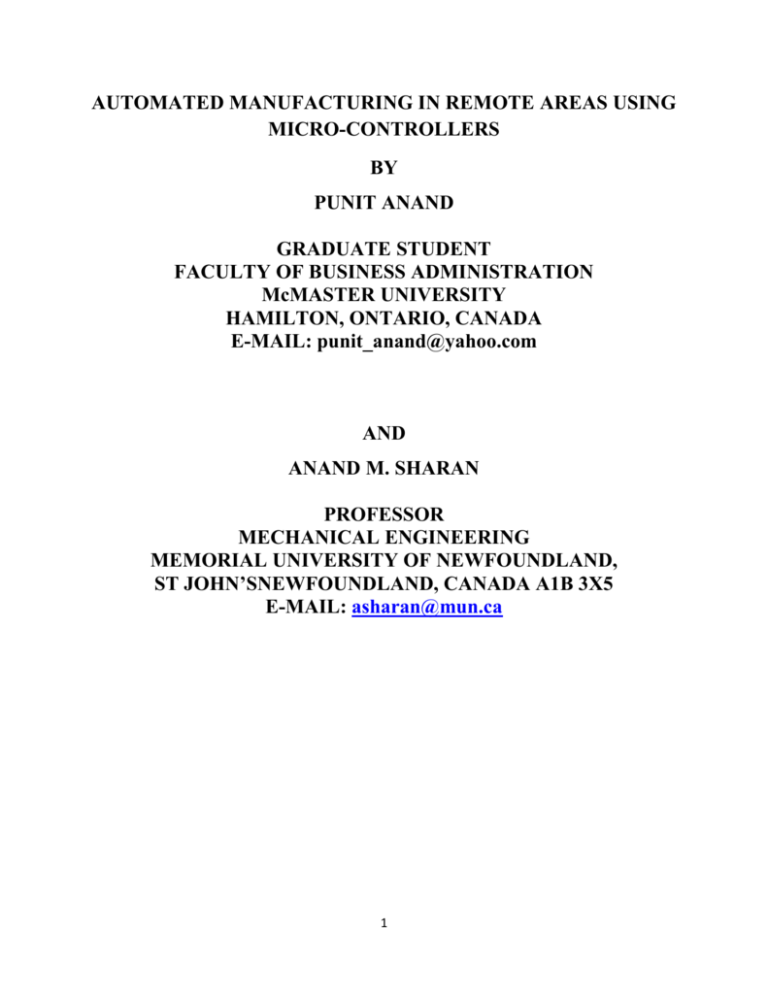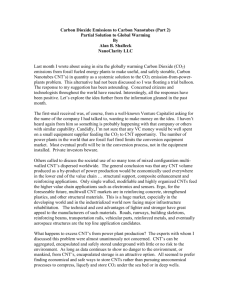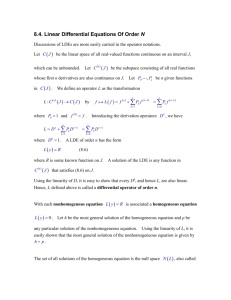Fig. 4 - Faculty of Engineering and Applied Science
advertisement

AUTOMATED MANUFACTURING IN REMOTE AREAS USING MICRO-CONTROLLERS BY PUNIT ANAND GRADUATE STUDENT FACULTY OF BUSINESS ADMINISTRATION McMASTER UNIVERSITY HAMILTON, ONTARIO, CANADA E-MAIL: punit_anand@yahoo.com AND ANAND M. SHARAN PROFESSOR MECHANICAL ENGINEERING MEMORIAL UNIVERSITY OF NEWFOUNDLAND, ST JOHN’SNEWFOUNDLAND, CANADA A1B 3X5 E-MAIL: asharan@mun.ca 1 ABSTRACT To achieve economical production, automation using microcontrollers have been used. This is carried out by mounting a frame for weaving a pattern on the end effector of an X-Y robot. The robot operates in conjunction with a sewing machine. The energy for driving these dc motor powered machines is obtained using photo-voltaic panels. The co-ordinated motions for the robot and sewing machine are obtained by programming a controller in mikrobasic language. KEYWORDS: Robots in manufacturing, Microcontroller based manufacturing, Robot and machines having co-ordinated motions. 2 1. INTRODUCTION In vast areas of the world, economical manufacturing in rural areas has become a necessity as the cities are becoming over-crowded. This requires introduction of high-tech industries to be located in such areas. Quite often, such places require introduction of low cost machines due to the shortage of capital in these areas. For an example, stitching / weaving type of industries require very small amount of power but are labour intensive. To reduce the cost – automation and mechanization is needed even here because hand-made products of matching quality are difficult to be produced economically in large quantities since the probability of error is there in every piece made. Secondly, if we introduce robots, they can make many more variety of products than earlier generation of machines like existing lathes and milling machines with human operators . 3 This paper deals with programming a microcontroller to make a pattern using a sewing machine. The microcontroller is used to provide motions to an X-Y or Cartesian robot as well as to a sewing machine as shown in Fig. 1. FIG. 1 MOTION TO EMBROIDERY FRAME BEING PROVIDED BY X-Y MOTION ROBOT 2. ILLUSTRATION OF MANUFACTURING DEVICES FOR AUTOMATED Fig 2 shows an arrangement where on a fabric, a geometrical shape has to be weaved (made). FIG. 2 BATTERY BEING CHARGED BY A SOLAR PANEL 4 To have co-ordinated motion in the X, Y and Z directions, one uses micro-controller shown in Fig. 3. FIG. 3 USE OF MICRO-CONTROLLER TO PROVIDE MOTION CONTROL Here two Pulse Width Modulated (PWM) signals are generated and sent to two respective H-Bridges (Fig. 4) corresponding to X and Y motions. The third motion, that of the needle along the Z direction, is given by motor 3. FIG. 4 THREE DC MOTORS CONTROLLED BY MICRO-CONTROLLER THROUGH H BRIDGES 5 These H Bridges are switching devices which open the high current gates using MOSFETs. The signals generated by micro-controllers in Fig. 3 can drive the two dc motors shown in Figs 1, and 2 using these H Bridges. 3. PROGRAMMING A MICRO-CONTROLLER A computer program written in MikroBasic was used to drive the motors in Fig. 5. 6 The program was written for making embroidery of circular shape as shown in Fig. 5. This figure shows a circle whose equation was obtained using a Fourier series. The Fourier coefficients were obtained using Fast Fourier Transform subroutine in MATLAB software These coefficients were stored in the memory of the controller. The pattern to be weaved was carried out in a sequential manner where a vertical line of variable length (1) was stitched followed by a very small horizontal line of fixed length(2) and then, again a vertical line(3) and so on. 7 Clearly, the end points of the vertical line were computed using Fourier coefficients on line. The associated computer program was written by referring to [9]. The chip used was Pic 18F45K22 which was mounted on an Easy Pic V7 Development Board. The experimental set up is shown in Fig. 7. Using these principles, one can introduce automation in rural and remote areas where one can manufacture other parts or products at reduced cost and of far better quality than what is being done presently. 8 4 CONCLUSIONS In this paper, a methodology was presented to introduce automation in rural and remote areas. By the introduction of micro-processors, these automated machines can be manufactured in rural areas, as well as such machines can be used to manufacture products. By introduction of automation, people will find employment in villages and it will reverse the migration to cities for better life. 5 ACKNOWLEDGEMENTS The author is thankful to Dr M. J. Hinchey, for his generous help in building hardware for controller. The author is also indebted to Dr. T. Iqbal for valuable assistance in course of this research. 9 6 REFERENCES 1. 2. 3. 4. 5. 6. 7. 8. 9. Ostwald , P.F., Amstead, B. H., and Begeman, M. L., “Manufacturing Processes” , 7th Edition, John Wiley and Sons, Toronto, Canada , pp 450-466. Sharan, A.M. , and Prateek, M. , 2006, “ Automation of Minimum Torque Based Accurate Solar Tracking Systems Using Microprocessors “ 86, Sept – Oct. , pp . 415 - 437 Journal of Indian Institute of Science Craig, J.,J.,” Introduction to Robotics, and Control”, 3rd Edition, Prentice Hall, New Jersey, USA, pp 62-92. Klafter, R. A., Chmielewski, T.A., and Negin, M, “Robotic Engineering: An Integrated Approach”, 1989 Edition. Prentice Hall, New Jersey, USA, pp 58-70. Guru, B.,S., and Hiziroglu, H.,R., “Electric Machinery and Transformers “,Third Edition, BJS Publishers, New York, USA, pp 201-244 ; 421-428 Sewing Machines, http://en.wikipedia.org/wiki/Sewing_machine MOSFET, http://en.wikipedia.org/wiki/MOSFET Fourier Analysis of Time Series, http://people.uncw.edu/hermanr/signals/Notes/Signals.htm Mazidi, M.,A., Mazidi, J., G., and McKinlay, R., D.,” The 8051 Microcontroller and Embedded Systems “, 2nd Edition, Prentice Hallm , New Jersey, USA, pp 153-178. PROGRAM '-----------------------------------------------------------------------------' FULL CIRCLE FILLUP '-----------------------------------------------------------------------------'PIK 18F45K22 on Easy Pic V7 Development Board; mikroBasic Pro for PIC V6.0.0 ' External 8 MHZ Oscillator ' Config Parameters ' Oscillator Frequency = 8 MHZ ' Oscillator Selection = HS Oscillator (medium power 4 -16 MHZ) ' 4X PLL Enable = Disabled ' Fail - Safe Clock Monitor Enabled ' Internal / External Oscillator Switchover = Enabled ' Power-up Timer = Enabled ' Brown-Out Reset = "Brown - Out Reset enabled in Hardware only (SBOREN is disabled) ' Brown out Reset Voltage = "VBOR set to 1.90 V nominal" ' Watch Dog Timer = Disabled ' Watchdog Timer Postscale = 1:32768 ' CCP2 MUX bit = CCP2 input/output is multiplexed with RC1 ' PORTB A/D = Enabled 10 ' ' ' ' ' ' ' ' ' ' ' ' ' ' ' ' ' ' ' ' ' ' ' ' ' ' ' P3A/CCP3 Mux bit = P3A/CCP3 input/output is multiplexed with RB5 HFINTOSC Fast Start-up = Enabled Timer3 Clock input mux = T3CK1 is on RC0 ECCP2 B Output mux = P2B is on RD2 MCLR PIN = MCLR pin enabled, RE3 input pin disabled Stack Full/ UnderFlow Reset = Enabled Low Voltage Program = Disabled Extended Instruction Set = Disabled Background Debug = Disabled Code Protection Block 0 = Block 0 not Code Protected Code Protection Block 1 = Block 1 not Code Protected Code Protection Block 2 = Block 2 not Code Protected Code Protection Block 3 = Block 3 not Code Protected Boot Block Code Protection = Disabled Data EEPROM Code Protection = Disabled Write Protection Block 0 = Disabled Write Protection Block 1 = Disabled Write Protection Block 2 = Disabled Write Protection Block 3 = Disabled Configuration Register Write Protection = Disabled Boot Block Write Protection = Disabled Data EEPROM Write Protection = Disabled Table Read Protection Block 0 = Disabled Table Read Protection Block 1 = Disabled Table Read Protection Block 2 = Disabled Table Read Protection Block 3 = Disabled Boot Block Table Read Protection = Disabled program MotorControl ' Global Declarations section ' PWM at 80% duty cycle is required to move by 1 resolution in +ve dir & ' PWM at 20% duty cycle is required to move by 1 resolution in -ve dir ' Number of PWM waves required to move the motor by a minimum X,Y Resolution const motor_res_x as longint = 100 const motor_res_y as longint = 100 ' minimum resolution in mm const res_x_mm as float = 1.0 const res_y_mm as float = 1.0 'PIC18F45K22 running at 8 MHZ ' PWM Timer to be at 500 HZ ' Timer0 is running at (8 Mhz/4) * (1/256), i.e 7812.5 HZ ' Therefore Timer0 multiple is 7812.5 / 500 = 15.625 const frequencymult as float =15.625 'const frequencymult as float =4000 11 const timerscale as float =1.0 const Constword as word = 0xFFFF ' global variables that always contain position vectors of the frame dim xpos as float dim ypos as float 'counter dim cnt as word '--------------Timer Interrupt handling--------------'This program uses TMR0L as a counter and when the register overflows it 'interrupts. This interrupt is used to generate PWM 'sub procedure Timer0_Interrupt iv 0x000008 ics ICS_AUTO 'sub procedure interrupt_low sub procedure interrupt 'IF INTCON.TMR0IF =1 Then TMR0H=0 TMR0L=0 'TMR set to initial value of 0 'INTCON.=0x20 'Interrupt control register only TMR0 overflow interrupt enabled 'INTCON.GIE=1 'INTCON.PEIE=1 'INTCON.TMR0IE=1 'INTCON.INT0IE=0 'INTCON.RBIE=0 INTCON.TMR0IF=0 'INTCON.INT0IF=0 'INTCON.RBIF=0 cnt = cnt +1 'end if end sub ' Counter incremented sub function AbsoluteValueFloat(dim abspara as float) as float IF abspara <0 THEN result = -abspara else result = abspara end if end sub '--------------MoveX_pos--------------'This subroutine moves the frame so that the needle is at xnew coordinate 'The exact number of PWM pulses are provided to the X motor to position the ' frame exactly below the needle. Position xnew in mm; 12 ' PWM1 is used for generating pulse. For PIC18F45K22 its RC2 (port c 3rd bit) ' which for 40pin DIP is pin #17 sub Procedure MoveX_pos(dim xnew as float) 'local declaration dim xmove, xtemp as float dim pwm_time as word dim cnt_limit as word dim cnt_start as word 'dim xtimerhi, xtimerlo as byte 'Delta movement computation xtemp = xnew - xpos xmove = xtemp / res_x_mm ' compute the # of PWM required to reach X position 'pwm_time = integer((AbsoluteValueFloat(xmove) * motor_res_x)/timerscale) pwm_time = integer((AbsoluteValueFloat(xmove) * motor_res_x * frequencymult)/timerscale) cnt_limit =1 ' By default it is set to cnt_limit setup IF pwm_time > Constword then cnt_limit = 1+ (pwm_time div Constword) cnt_start = pwm_time - Constword*(cnt_limit-1) else cnt_limit =1 cnt_start = Constword - pwm_time end if cnt =0 'Duty cycle set on the choice of direction IF xmove >0 THEN PWM1_Set_Duty (204) 'function takes only values in byte, 204 is 80% duty cycle 'INTCON = 0xA0 'Interrupt control register Global interrupt & TMR0 overflow enab else PWM1_Set_Duty (51) 'function takes only values in byte, 51 is 20% duty cycle 'INTCON = 0xA0 'Interrupt control register Global interrupt & TMR0 overflow enab end if 'TMR0L Loaded 'T0CON.7=0 'xtimerhi = Hi(cnt_start) 'xtimerlo = Lo(cnt_start) 'TMR0H = xtimerhi 13 'TMR0L = xtimerlo 'T0CON.7=0 TMR0H = Hi(cnt_start) TMR0L = Lo(cnt_start) T0CON.TMR0ON =1 ' loop until timer overflow interrupt do loop until cnt = cnt_limit 'delay_ms(500) PWM1_Set_Duty (127) 'PWM1_Stop() cnt=0 xpos = xnew ' New xposition T0CON.TMR0ON =0 end sub '--------------MoveX_pos_delta--------------' Move the motor by the smallest possible amoount in positive x direction sub Procedure MoveX_pos_delta dim posdelta as float posdelta = xpos + res_x_mm MoveX_pos(posdelta) 'MoveX_pos(xpos + res_x_mm) end sub '--------------MoveX_neg_delta--------------' Move the motor by the smallest possible amoount in positive x direction sub Procedure MoveX_neg_delta dim negdelta as float negdelta = xpos - res_x_mm MoveX_pos(negdelta) 'MoveX_pos(xpos - res_x_mm) end sub '--------------MoveY_pos--------------'This subroutine moves the frame so that the needle is at ynew coordinate 'The exact number of PWM pulses are provided to the Y motor to position the ' frame exactly below the needle. Position ynew in mm; ' PWM2 is used for generating pulse. For PIC18F45K22 its RC1 (port c 2nd bit) ' which for 40pin DIP is pin #16 sub Procedure MoveY_pos(dim ynew as float) 14 'local declaration dim ytemp, ymove as float dim pwm_time_y as word dim cnt_limit_y as word dim cnt_start_y as word ' xmove 'Delta movement computation ytemp = ynew - ypos 'Motor direction control to be determined by xmove ymove = ytemp / res_y_mm ' compute the # of PWM required to reach X position 'pwm_time = integer((AbsoluteValueFloat(ymove) * motor_res_y)/timerscale) pwm_time_y = integer((AbsoluteValueFloat(ymove) * motor_res_y * frequencymult)/timerscale) cnt_limit_y =1 ' By default it is set to cnt_limit setup IF pwm_time_y >Constword then cnt_limit_y = 1+ (pwm_time_y div Constword) cnt_start_y = pwm_time_y - Constword*(cnt_limit_y-1) else cnt_limit_y =1 cnt_start_y = Constword - pwm_time_y end if cnt =0 TMR0H = Hi(cnt_start_y) TMR0L = Lo(cnt_start_y) T0CON.TMR0ON =1 'PWM2_Init(488) 'PWM2_Start() IF ymove >0 THEN PWM2_Set_Duty (204) 'function takes only values in byte, 204 is 80% duty cycle 'INTCON = 0xA0 'Interrupt control register Global interrupt & TMR0 overflow enab else PWM2_Set_Duty (51) 'function takes only values in byte, 51 is 20% duty cycle 'INTCON = 0xA0 'Interrupt control register Global interrupt & TMR0 overflow enab end if ' TMR0H & TMR0L Loaded ' Loop until timer overflows do 15 loop until cnt = cnt_limit_y 'delay_ms(500) PWM2_Set_Duty (127) 'PWM2_Stop() cnt=0 ypos = ynew T0CON.TMR0ON =0 end sub '--------------MoveY_pos_delta--------------' Move the motor by the smallest possible amount in positive y direction sub Procedure MoveY_pos_delta dim posdelta as float posdelta = ypos + res_y_mm MoveY_pos(posdelta) end sub '--------------MoveY_neg_delta--------------' Move the motor by the smallest possible amount in negative y direction sub Procedure MoveY_neg_delta dim negdelta as float negdelta = ypos - res_y_mm MoveY_pos(negdelta) end sub ' 6th bit of Port C RC5, 24th pin of 40 DPI is 1 sub procedure NeedleOn() PORTC.5 = 1 'RC5 or the 6th bit 1 for needle motor to switch on end sub sub procedure NeedleOff() PORTC.5 = 0 'RC5 or the 6th bit 0 for needle motor to switch off end sub '----------WEAVE OPERATION UP TO DOWN ------------' yup and ydown as integer sub procedure WeaveYUpDown(dim yp,yn as float) ' Local Declaration dim forcounter, PDtemp as integer 'PORTC = 0 ' PORT C =0 'TRISC = 0 ' Set Port C as output PDtemp = integer((yp - yn) / res_y_mm ) + 1 16 'Move the needle to Yup position IF ypos = yp then else MoveY_pos (yp) end if 'switch on the needle 'NeedleOn() ' Y to be moved by the y resolution For forcounter = 1 to PDtemp step 1 MoveY_neg_delta() next forcounter 'switch off the needle 'NeedleOff() end sub '----------WEAVE OPERATION DOWN TO UP ------------' yup and ydown as integer sub procedure WeaveYDownUP(dim yplus,yminus as float) ' Local Declaration dim forcounter, DPtemp as integer 'PORTC = 0 ' PORT C =0 'TRISC = 0 ' Set Port C as output DPtemp = integer((yplus - yminus) / res_y_mm) + 1 'Move the needle to Ydown position IF ypos = yminus then else MoveY_pos (yminus) end if ' Switch on the needle 'NeedleOn() For forcounter = 1 to DPtemp step 1 MoveY_pos_delta() next forcounter ' Switch off the needle 'NeedleOff() end sub 'In order to weave a circle, fourier series is employed. '--------------------------Fourier Part begins--------------------------' sub function GetYup(dim i,N as integer) as float dim A0,A1,A2 as float dim B0,B1,B2 as float dim compT0,compT1,compT2,compT3,compT4 as float 17 A0 = 7.0554 A1 = -0.5140 A2 = 0.0013 B0 = 0.0 B1 = 0.0294 B2 = 0.0010 'get y location 'i dont know how to do arrays in basic, so doing individually compT0 compT1 compT2 compT3 compT4 = = = = = A0/2 A1*cos(2*PI*i/N) B1*sin(2*PI*i/N) A2*cos(2*PI*2*i/N) B2*sin(2*PI*2*i/N) IF i=0 THEN result = compT0 else result = compT0+compT1+compT2+compT3+compT4 end if end sub sub function GetYdown(dim i,N as integer) as float dim ymin, ytmp as float ymin = 3.0 ytmp = GetYup(i,N) result = (2*ymin) - ytmp end sub '--------------------------Fourier Part ends--------------------------' main: ' Main program ' assume that you have to start weaving at X initial position dim N,i,j as integer dim yup as float dim ydown as float dim xinitial as float yup =0.0 ydown =0.0 xinitial = 10.0 N = 144 ' initial values xpos=0.0 ypos=0.0 cnt =0 'Configuring AN PINS as Digital I/O 'ANSEL =0 ANSELC = 0 TRISC = 0 ' Set Port C as output PORTC = 0 ' PORT C =0 18 'Selecting Frequency to be 31.25KHZ Internal source ' OSCOCN2 Register Oscillator Control Register 2 ' PLLRDY; SOSCRUN; Unimplemented; MFIOSEL; SOSCGO;PRISD;MFIOFS;LFIOFS 'OSCCON2 =%01000101 'OSCTUNE Register 'INTSRC; PLLEN; TUN <5:0> 'OSCTUNE =%00100000 'OSCCON Register 'IDLEN; IRCF <2:0>, OSTC; HFINTOSC; SCS <1:0> 'OSCCON =%00000010 'T0CON Timer0 Control Register 8 bits are TMR0ON, T08BIT, T0CS, T0SE, PSA, ' TOPS <2:0>, 16 bit timer with 1:16 prescale vale ' TMR0ON, T08BIT, TOPS (100) (1/4 * 1/256) 1:1024 frequency value 'T0CON.TMR0ON =0 'Timer Stopped 'T0CON.T08BIT =0 '16 Bit Timer Mode 'T0CON.T0CS =0 'Use System Clock to Increment Timer 'T0CON.T0SE =0 'T0CON.PSA =0 'Use Prescaler to Timer0 'T0CON.TOPS2 =1 'Use 1:256 prescaler 'T0CON.TOPS1 =1 'T0CON.TOPS0 =1 T0CON = %00000111 'T0CON = %00001000 TMR0H=0 TMR0L=0 'TMR set to initial value of 0 'Intcon Register 8 bits are GIE/GIEH; PEIE/GIEL; TMR01E; INT01E; RBIE; TMR01F; ' INT01F; RBIF RCON.IPEN=0 'RCON.IPEN=1 'INTCON2.TMR0IP=1 INTCON.GIE=1 INTCON.PEIE=1 INTCON.TMR0IE=1 INTCON.INT0IE=0 INTCON.RBIE=0 INTCON.TMR0IF=0 INTCON.INT0IF=0 INTCON.RBIF=0 'INTCON=0xA0 enable interrupt TMR0 'TxCon Timer 1/3/5 'TMRxCS<1:0>; TxCKPS<1:0>; TxSOSCEN; TxSYNC;TxRD16;TMRxON 'TMRxCS =00 instruction cycyle (1/4); TxCKPS<1:0>=11 (1/8) 19 'T1CON=%00110101 'T3CON=%00110101 'TxCON, Timer 2/4/6 'Unimplemented; TxOutps postcaler <3:0> ; TMRxON; TXCKPS (prescaler) PR2 = %11111001 T2CON = %00000111 CCPR1L = %01111100 CCP1CON = %00111100 ' With this LF Stable Oscillator at 31.25 KHZ is chosen as the primary clock ' driving Timer0, Timer2 at prescale value of 1/64; ' PWM will be generated at frequency 488.28 Hz 'PWM1_Init(488) 'PWM2_Init(488) 'PWM1_Init(500) 'PWM2_Init(500) PWM1_Start() PWM2_Start() PWM1_Set_Duty (127) PWM2_Set_Duty (127) MoveX_pos (xinitial) j=0 PORTC = 0 ' PORT C =0 TRISC = 0 ' Set Port C as output NeedleOn() for i = 0 to N step 2 IF i =0 then yup = GetYup(i,N) else yup = GetYup(j,N) end if ydown = GetYdown(i,N) WeaveYUpDown(yup,ydown) 'WeaveYUpDown(yup,6.0-yup) j = i+1 'delay_ms(1000) MoveX_pos_delta 'delay_ms(1000) yup = GetYup(j,N) ydown = GetYdown(i,N) WeaveYDownUp(yup,ydown) 'WeaveYDownUp(yup,6.0 - yup) MoveX_pos_delta next i PWM1_Stop() PWM2_Stop() 20 NeedleOff() end. 21




